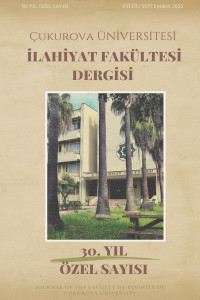ÇATIŞAN DÜNYA GÖRÜŞLERİ: PROTESTAN EVANJELİK HIRİSTİYANLIĞIN AYRIŞMASI
Dinler Tarihi, Felsefe, Dünya Görüşü, Evanjelik, Modernizm, Sekülerizm.
Conflicting Worldviews: The Disintegration of Protestant Evangelical Christianity
History of Religious, Philosophy, Worldview, Evangelic, Modernism, Secularism,
___
- Antoun, Richard T. Understanding Fundamentalism: Christian, Islamic and Jewish Movements. Walnut Creek, Lanham, New York, Oxford: AltaMira Press, 2001.
- Bartholomew, Craig G. Contours of the Kuyperian Tradition. Downers Grove, IL: InterVarsity Press, 2017.
- Bratt, James D. Abraham Kuyper: Modern Calvinist, Christian Democrat. Grand Rapids, Michigan, Cambridge, UK: William B. Eerdsmans Publishing Company, 2013.
- Clark, Maudemarie. Nietzsche on Truth and Philosophy. Cambridge, New York, Port Chester, Melbourne, Sydney: Cambridge University Press, 1990.
- Dooyeweerd, Herman. A New Critique of Theoretical Thought: The Necessary Presuppositions of Philosophy. çev. William S. Young-David H. Freeman. USA: The Presbyterian and Reformed Publishing Company, 1969.
- Dooyeweerd, Herman. Roots of Western Culture: Pagan, Secular and Christian Oprions. Toronto: Wedge Publishing Foundation, 1979.
- Elshtain, Jean Bethke. Sovereignty: God, State and Self. New York: Basic Books, 2008.
- Geertz, Clifford. Yerel Bilgi, çev. Kudret Emiroğlu, Ankara: Dost Kitabevi, 2007.
- Hankins, Barry. American Evangelicals: A Contemporary History of a Mainstream Religious Movement, United States of America: y Rowman & Littlefield Publishers, Inc, 2009.
- Hamilton, Michael S. “American Evangelicalism: Character, Function, and Trajectories of Change.” The Future of Evangelicalism in America, ed. Candy Gunther Brown-Mark Silk. New York: Columbia University Press, 2016.
- Henderson, Roger. “The Development of the Principle of Distributed Authority, or Sphere Sovereignty,” Philosophia Reformata 82/1 (Nisan, 2017), 74-99. https://doi.org/10.1163/23528230-08201005
- Huntington, Samuel P. Who Are We: The Challenges to America’s National Identity. New York, London, Toronto, Sydney: Simon & Schuster Paperbacks, 2004.
- Paul G. Hiebert, Transforming Worldviews: An Anthropological Understanding of How People Change (Grand Rapids, Michigan: Baker Academic, 2008), 30.
- Jones, Julie Scott. Being the Chosen: Exploring a Christian Fundamentalist Worldview. UK: Ashgate Publishing Company, 2010.
- Kuyper, Abraham. Calvinism: Six Lectures Delivered in the Theological Seminary at Princeton. New York, Chicago, Toronto: Fleming H. Revell Company, 1898.
- Levine, Peter. Nietzsche and the Modern Crisis of the Humanities. Albany: State of New York University Press, 1995.
- Marsden, George M. The Soul of the American University: From Protestant Establishment to Established Nonbelief. New York: Oxford University Press, 1994.
- Marsden, George M. Understanding Fundamentalism and Evangelicalism. Grand Rapids, Michigan: William B. Eerdsmans Publishing Company, 1991.
- Mcilroy, David H. “Subsidiarity and Sphere Sovereignty: Christian Reflections on the Size, Shape and Scope of Government,” Journal of Church and State 45/4 (Sonbahar, 2003), 739–763. https://www.jstor.org/stable/23920937
- Moreland, J. P.-William Lane Craig. Philosophical Foundations For a Christian Worldview. Downers Grove, IL: InterVarsity Press, 2003.
- Niebuhr, Reinhold. Faith and History: A Comparison of Christian and Modern Views of History. New York: Charles Scribner’s Sons, 1949.
- Naugle, David K. Worldview: The History of a Concept. Grand Rapids, Michigan, Cambridge, UK: William B. Eerdsmans Publishing Company, 2002.
- Olson, Laura R.-Warber, Adam L. “The Mainline Protestant Vote,” Religion and the Bush Presidency, Ed. Mark J. Rozell and Gleaves Whitney, United States: Palgrave Macmillan, 2007.
- Orr, James. Christian View of God and the World. PDF: Christian Classics Ethereal Library, 9. Basım 1908. http://www.ccel.org
- Plank, William. Nietzsche ve Varlık: Güç Istenci ve Dağıtık Sistemlerin Doğası Üzerine. İstanbul: Mitra Yayınları, 2012.
- Schaeffer, Francis A. A Christian Manifesto. Wheaton, Illinois: Crossway Books, 1981.
- Sire, James W. Naming the Elephant: Worldview as a Concept. Downers Grove, IL: InterVarsity Press, 2004.
- Tarnas, Richard. The Passion of the Western Mind. London: Pimlico, 2010.
- Topcan, Özlem, “Protestan Evanjeliklerin Amerika-İsrail İlişkilerindeki Rolü Üzerine Teolojik, Politik ve Tarihsel Değerlendirme,” Turkish Academic Research Review 7/4 (2022).
- Tuininga, Matthew J. Calvin’s Political Theology and the Public Engagement of the Church. United Kingdom: Cambridge University Press, 2017.
- Uygur, Nermi. Dünya Görüşü. İstanbul: Elif Yayınları, 1963.
- Vidal, Clement. The Beginning and the End: The Meaning of Life in a Cosmological Perspective. Switzerland: Springer International Publishing, 2014.
- Weir, Todd H. Defending the Faith: Global Histories of Apologetics and Politics in the Twentieth Century. UK: Oxford University Press, 2020.
- Wolters, Albert M. Creation Regained: Biblical Basics for a Reformational Worldview. Grand Rapids, Michigan, Cambridge, UK: William B. Eerdsmans Publishing Company, 2. Basım, 2005.
- Wolters, Albert M. “Dutch Neo-Calvinism: Worldview, Philosophy and Rationality.” Rationality in the Calvinian Tradition, ed. H Hart vd. 113-131. UPA: Toronto, 1983.
- Wolters, Albert M. “On The Idea of Worldview and Its Relation to Philosophy.” Stained Glass, ed. Paul A. Marshall vd. 14–25. Lanham, Md: University Press of America, 1983.
- Yayın Aralığı: Yılda 2 Sayı
- Başlangıç: 2001
- Yayıncı: Çukurova Üniversitesi
ARAPLARDA HURMANIN YERİ, ÖNEMİ VE İBN VAHŞİYYE’NİN HURMA RİSALESİ’NİN DEĞERLENDİRİLMESİ
ETKİLENDİĞİ VE ETKİLEDİĞİ USULCÜLER BAĞLAMINDA İMÂMÜ’L-HAREMEYN EL-CÜVEYNÎ
KÂBE’NİN TARİHİ VE ANLAMI ÜZERİNE BAZI TESPİTLER
TÜRKİYE’DEKİ MAHALLİ ARAP LEHÇELERİ ÜZERİNE BİR BİBLİYOGRAFYA DENEMESİ
İbrahim ÖZCAN, Ömer ACAR, Ramazan KILIÇ
EVRİM-DİN ARASINDA ALGILANAN ÇATIŞMA ÖLÇEĞİNİN TÜRKÇEYE UYARLANMASI
FARABİ’NİN AHLAK FELSEFESİ: EN YÜKSEK İYİ VE ONU GERÇEKLEŞTİRMENİN ARAÇLARI
PALLE YOURGRAU, SİMONE WEİL, ÇEV. ÜMİD GURBANOV, İSTANBUL: KETEBE YAYINLARI, 2019, 200 SAYFA.
HAÇLI SEFERLERİNDE KÖLE TİCARETİ ÜZERİNE BİR DEĞERLENDİRME
ÇATIŞAN DÜNYA GÖRÜŞLERİ: PROTESTAN EVANJELİK HIRİSTİYANLIĞIN AYRIŞMASI
